
If stolen content is damaging your reputation online, a Google DMCA takedown can help remove it from search results.
Whether it’s a copied blog post, image, or video, the DMCA process lets you request removal—if you meet the right criteria and follow the steps carefully.
This guide shows you exactly how to file a DMCA notice, when it applies, and what to do if it doesn’t.
A Google DMCA Takedown is a formal request to remove links from Google Search that point to copyrighted material you own. It’s based on the Digital Millennium Copyright Act (DMCA), a U.S. law designed to protect creators from content theft online.
When approved, a DMCA takedown can lead to:
DMCA takedowns are especially useful if your stolen content is harming your personal or professional reputation. We often see this effect:
But, it’s important to understand what a DMCA notice can’t do:
It removes the link from Google Search, not the content from the original website. If you want to take the content down at the source, you’ll need to go beyond the DMCA process.
To file a DMCA takedown with Google, you must be the copyright owner or have permission from the owner.
Just because you appear in a photo or video doesn’t mean you own it—if someone else took the photo, they hold the copyright.
DMCA takedowns are for stolen original content like writing, photos, and videos—not for content that’s:
If your situation doesn’t qualify, there are still ways to remove or suppress the content from search results.
Not all online content qualifies for a Google DMCA Takedown. To be eligible, the content must infringe on copyrighted material that you own–not just content that’s upsetting, embarrassing, or false.
Understanding what counts (and what doesn’t) can save you time and help you take the right next step.
Eligible for a DMCA Takedown | Not Eligible for a DMCA Takedown |
Blog posts or articles you wrote | Public records (e.g., court cases) |
Photos, videos, or designs you created | Photos or videos you didn’t create (the photographer owns the copyright) |
Business bios or website content copied without consent | Negative reviews or personal opinions |
Social media content you created and posted | Content previously shared with permission or under terms of services |
Course materials, eBooks, or original documents | Factual reporting or news coverage |
Work reposted without permission and not protected under fair use | Parody, commentary, or review content protected under fair use |
If your situation doesn’t qualify for a DMCA takedown, you’re not out of options.
There are other ways to remove or bury harmful content–especially if it’s hurting your reputation, privacy, or livelihood.
Here’s what you can try instead:
Option | What it Does | Learn More |
Content Removal Requests | Request removal directly from platforms if content violates policies (e.g. harassment, defamation, impersonation). | |
Suppression Strategies | Publish positive, SEO-friendly content to outrank and push harmful results off the first page. | |
Search Result De-Indexing | Remove links from Google search results even if the content stays live on the original site. | |
Review Management | Remove or manage fake or damaging reviews that harm your business reputation. | |
Public Record Removal | Remove personal details like arrests or lawsuits scraped from public records and posted online. | |
Leaked Images Removal | Remove private or sensitive photos or videos shared without your consent, even when DMCA doesn’t apply. |
Reputation911 offers custom content removal services for professionals, executives, and businesses facing complex reputation issues.
Before filing a DMCA takedown with Google, it’s essential to gather strong, clear evidence. This helps Google verify your claim and speeds up the review process.
Here’s what to prepare:
The more complete your evidence, the more likely Google is to honor your takedown request.
Ready to file? We’ll walk you through the steps next.
Once you’ve gathered your evidence, you’re ready to submit your request.
Filing a Google DMCA takedown notice can feel intimidating, especially if it’s your first time–but the process is more straightforward than it seems. The key is to follow each step carefully and provide clear, accurate information.
Here’s a quick overview of the process
To begin your takedown request, you’ll need to access Google’s official copyright removal tool.
Start by clicking this link: Google DMCA Dashboard
Log into your Google account if you aren’t already. Use the same email address you’ll list in the form – Google will send all confirmation and case status updates to that email address.

Once logged in, you’ll be guided through a series of questions to help Google understand where the infringing content appears and what types of copyrighted material you’re protecting.
If you don’t own your name as a domain yet, now’s the time to claim it. A well-optimized website is one of the strongest tools you have to bury negative search results long-term.
After logging into the DMCA dashboard, Google will ask which product your complaint is about.
You’ll see options like:
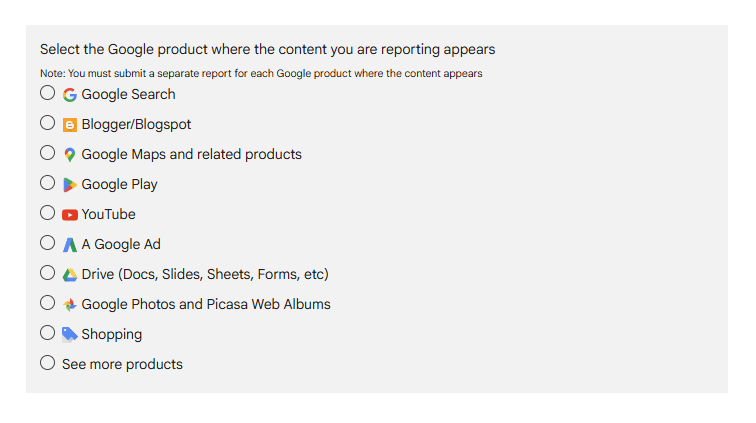
Be sure to select the specific platform where the infringing content appears. If the content is posted across multiple platforms, you’ll need to submit separate takedown requests for each one.
Example: If a stolen photo appears in both Google Search and on a YouTube video, submit two separate forms — one for each platform.
Next, select whether the content appears on Google Search, Google Images, or another search feature.
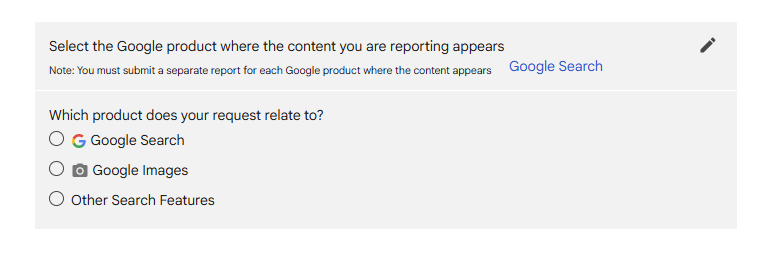
You will then be asked if the request relates to content generated by AI within a Google product. Select Yes or No.
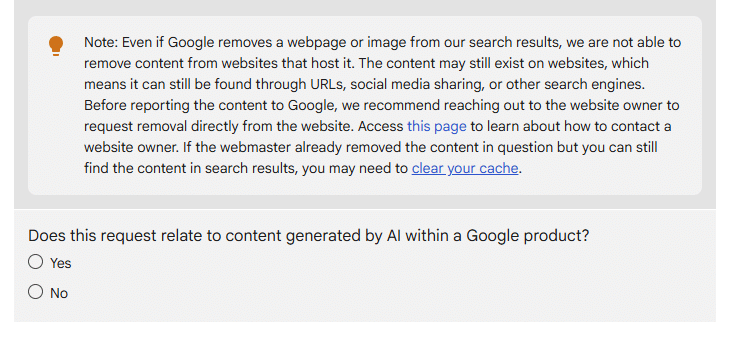
Once you’ve chosen the correct Google product, you’ll be asked why you’re reporting the content. Follow these steps:
Select “Legal Reasons to Report Content“

Select “Intellectual Property”
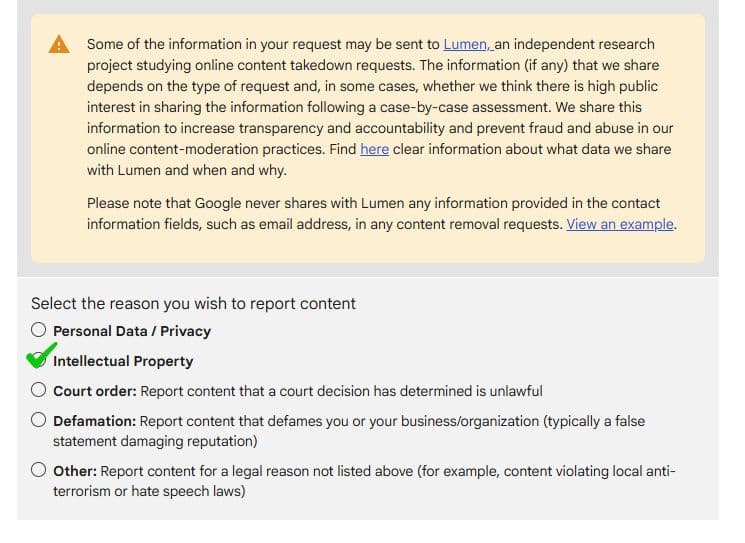
Select “Copyright”

This informs Google that your request is a DMCA takedown notice, not a general complaint or privacy issue. Selecting the wrong category can delay your request or send it to the wrong team.
Next, you’ll confirm that you have the legal right to submit the DMCA request and officially begin creating your request.
You will be asked, “are you the copyright owner or authorized to act on their behalf?” Select “Yes” to continue.

Next, choose the type of work that was stolen–image, video, or other.

Read the instructions carefully, then click the blue “Create Request” button.
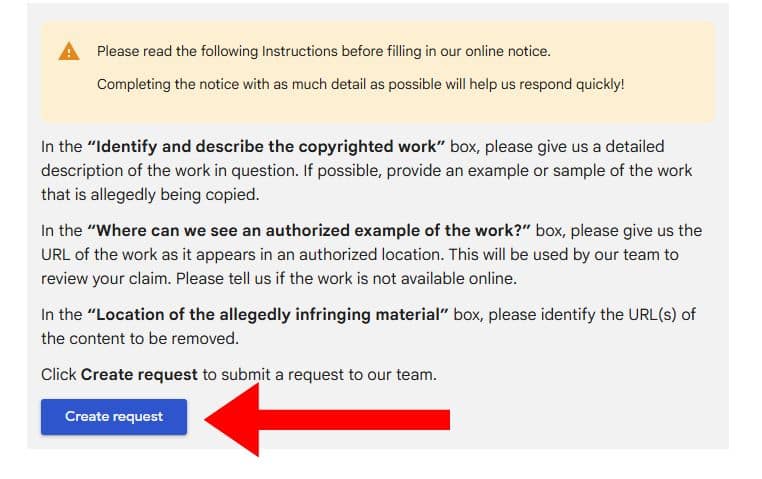
After you click the “Create Request” button, you’ll be asked to sign in if you haven’t already done so.
Once you’ve created your request, Google will prompt you to enter your personal and ownership details. This confirms who you are and establishes that you have the legal right to file the complaint.
Here’s what to fill out:
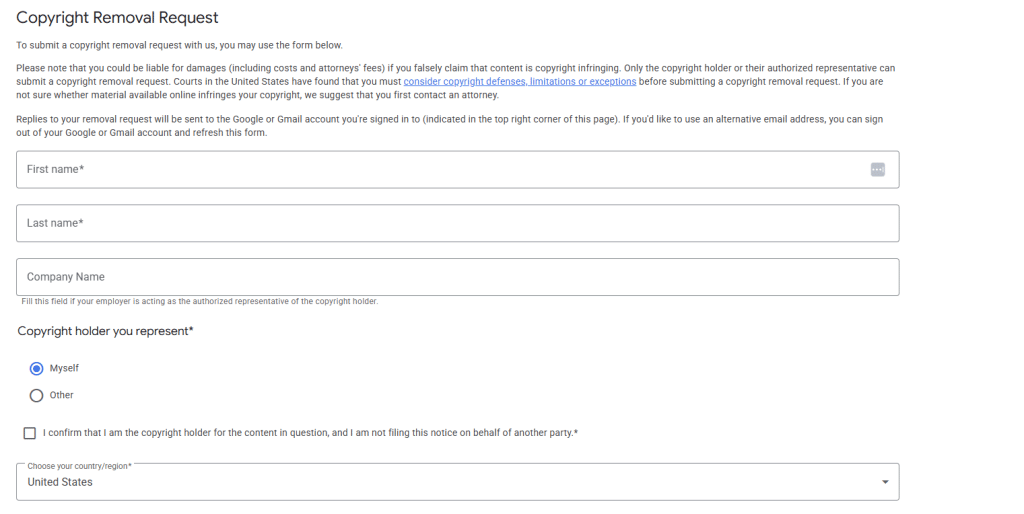
Now it’s time to describe the content you own and show exactly where it appears online–and where it’s been copied without your permission.
First, Google will ask:
“Is the submission related to an unauthorized stream of an upcoming live-event?”
Select “Yes” or “No”, depending on your situation (most cases should select No.)

Next, identify and describe the work.
Give the title of your original content and a brief, clear description of what it is (e.g., “Original blog post published on my website,” or “Professional headshot taken by me”).
Then, provide URLs where the copyrighted work can be viewed. Add the link to your original content (e.g., your blog post, portfolio, or social media post). This helps Google confirm that you created it.
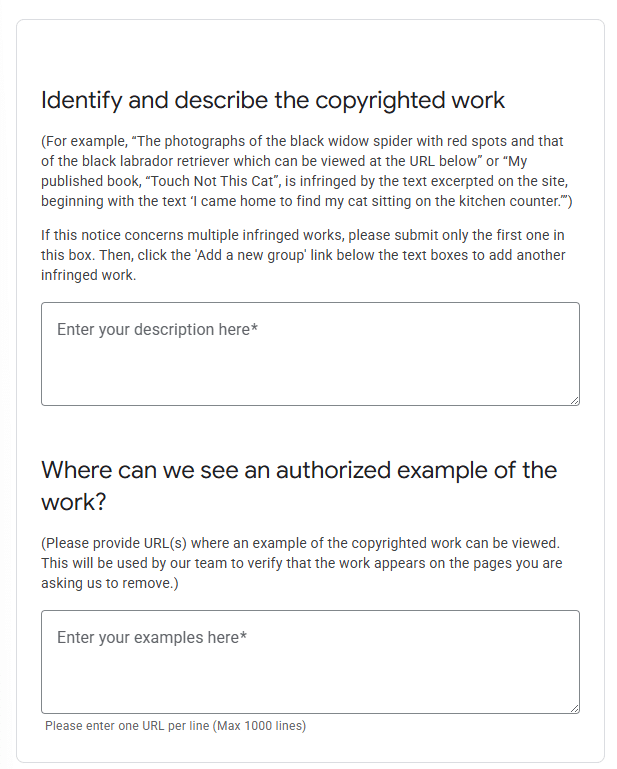
Give the location of infringing materials. Add the URL of the stolen or copied content–this is what you want Google to remove from search results or its platforms.
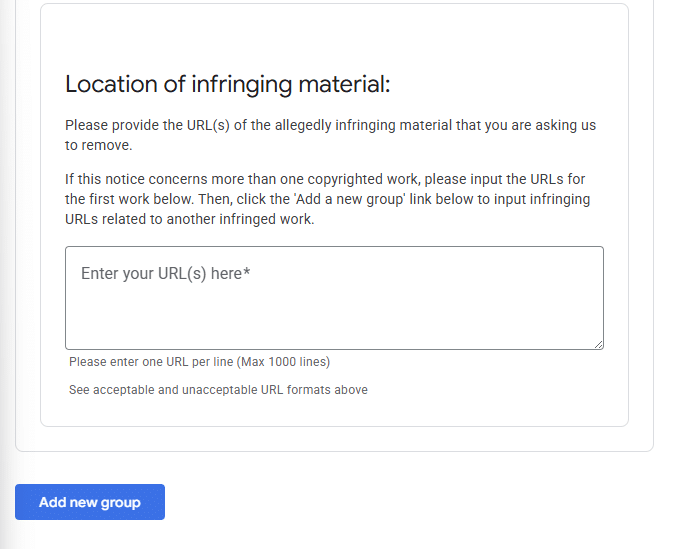
If multiple works have been stolen and posted to the same Google product, click the blue “Add new group” button to include more than one work.
Before Google processes your takedown request, you’ll need to confirm a few legal statements and sign the form electronically.
Check off the required boxes to confirm:
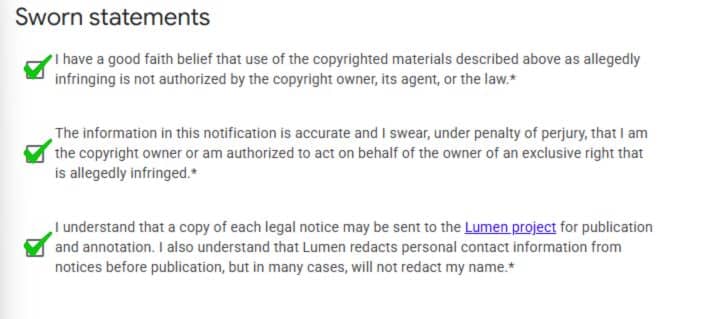
Next, give your electronic signature. Select today’s date and type your full name into the signature box.
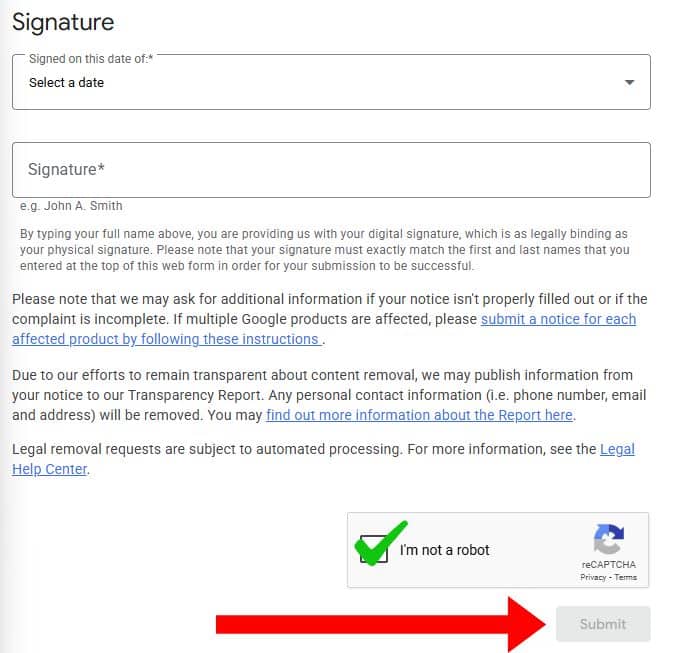
Finally, complete the CAPTCHA to verify you’re not a bot and click the “Submit” button to finish.
Once submitted, Google will review your request and email you updates about the status of your takedown.
Submitting a DMCA notice is a legal action. Be sure everything you’ve entered is accurate and complete before signing.
Once you submit your request, Google will begin reviewing your case. Here’s what to expect:
If a valid counter-notice is filed, you’ll be notified. At that point, unless you file a lawsuit within 10–14 business days, Google may restore the content to search results.
The DMCA process gives both parties a chance to be heard. That’s why it’s important to submit strong, clear evidence the first time.
If Google rejects your DMCA takedown request, don’t panic. It doesn’t necessarily mean your claim is invalid—it may just need more detail or better documentation.
Here’s what to do next:
Filing a Google DMCA takedown can help remove stolen content from search results—but it’s not always quick or easy.
Key Takeaways:
If you’re struggling with the process or your case doesn’t qualify, Reputation911 can help with personalized content removal services.